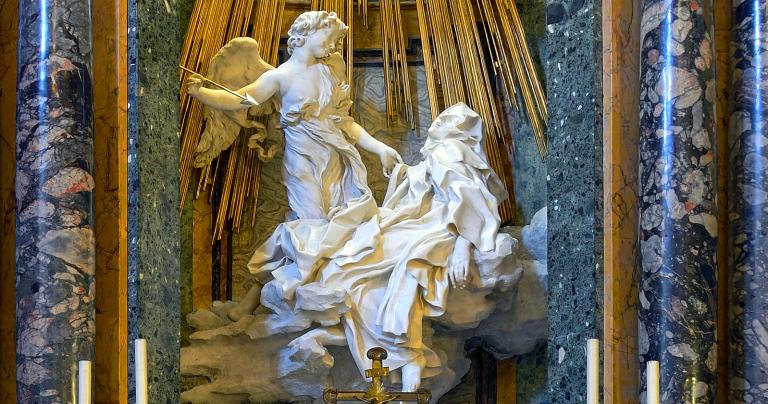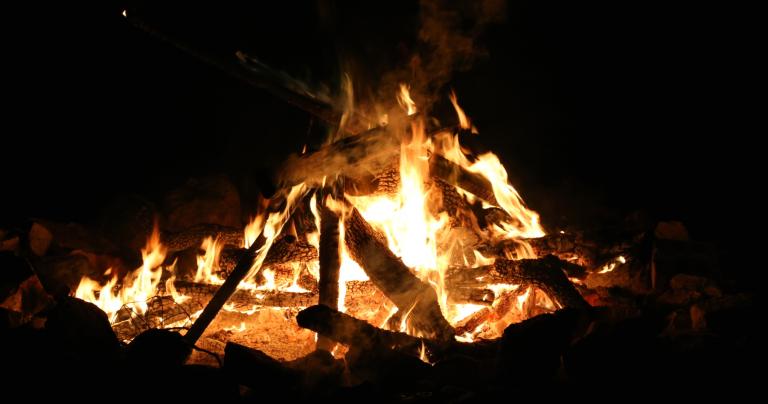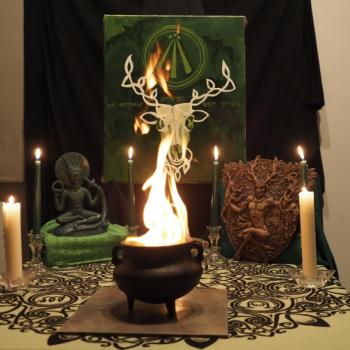Much of what I write here on Under the Ancient Oaks is intended for advanced beginners and intermediate Pagans – people who already know the basics, but who are trying to build a solid foundation for a deeper practice of their Paganism. Today, though, I want to speak specifically to the advanced intermediates – people who have a consistent and meaningful practice within a context of devotional polytheism.
People who feel the call to mystical and ecstatic practice.
People who are contemplating taking an oath to a deity.
I’m far from an expert, but I’ve been doing this a while. I’m currently being pulled deeper into it. And I have a message for you, one I hope you’ll hear.
Their ways are not our ways.
The ecstatic experience
Saint Teresa of Avila was a Christian theologian, nun, and mystic. She lived in Spain in the 16th century. I first discovered her through her quote “I am more afraid of those who are terrified of the devil than I am of the devil himself.” That was a very reasonable position in 16th century Spain… and also in 21st century America.
In 1559 she had a mystical experience of an angel that she described like this:
I saw in his hand a long spear of gold, and at the point there seemed to be a little fire. He appeared to me to be thrusting it at times into my heart, and to pierce my very entrails; when he drew it out, he seemed to draw them out also, and to leave me all on fire with a great love of God. The pain was so great, that it made me moan; and yet so surpassing was the sweetness of this excessive pain, that I could not wish to be rid of it…
This is not a dissolution of self and a feeling of oneness with the Universe. This is not a renunciation of the world. This is not a call to become a priest or a teacher or some other kind of leader. This is pain that is both unbearable and unavoidably addictive. This is ecstasy.
This is your life turned upside down. This is you, unmade and remade into something you may not recognize.
And it is not an experience limited to Christians.

A common method, not the unity of the divine
Mystics of different religions often have more in common with each other than with ordinary followers of their own religion. When I first read this, I took it as evidence for soft polytheism – the idea that all Gods are aspects or faces of One God.
That was a mistake on my part.
The fact that Christian, Buddhist, and Pagan mystics report similar experiences is no more proof of the unity of all Gods than it is proof of the unity of all humans. Rather, it points to a common method of how humans (as a subset of all beings) interact with Gods (as a subset of all beings).
Remember, mystics don’t practice a religion called Mysticism. Rather, they continue to identify and practice as Roman Catholics, Tibetan Buddhists, or Hellenic polytheists, even when the leaders of their orthodoxy try to silence them – as frequently happens.
And with that understanding, let’s look at what this means for us as Pagans.
Many Gods, many ways
There are some attributes that all Gods share because Gods are a subset of all beings, but in general it is an error to speak of the many Gods as though They’re all playing on the same team and working toward the same goals. A simple reading of the stories of our ancestors tells us They are not.
Different Gods call different people to worship and work with Them in different ways. What follows flows from my own experiences with the handful of deities with whom I am closely acquainted. If what your Gods are asking you to do is different from this, you should of course listen to Them and not to me.
But I’m hearing this from many other people, so I don’t think it’s just me.
What an oath means
There was a time when a person’s word was their bond. There have always been liars and cheats – I’m not talking about them. I’m talking about ordinary people who consider themselves to be people of integrity. Boasting was a virtue – if you could and would back it up with action. Now it seems that a promise means “I will, maybe, if it’s not too inconvenient, and if nothing better presents itself first.”
An oath to a deity is a contract. Choose each word and each phrase with great care. If you leave things open to interpretation, expect that it will be interpreted to Their benefit, not yours.
Particularly in this era of religious plurality, there is simply no excuse for making oaths you don’t want to make or don’t intend to keep. If you don’t want to do what’s being asked, say no… if you can say no. Oaths aren’t always necessary. If you have to, find another God. Or find another religion.
Believe me on this: the Gods will hold you to your word. If you promise to do something, you will do it or you will suffer. Not ecstatic suffering like Teresa of Avila described, but ordinary, painful, unpleasant, when-is-it-ever-going-to-end suffering. It will end when you do it, or when They get tired of fooling with you and decide to cut you out of Their work.
The Gods tend to be more understanding of extenuating circumstances than the Fair Folk (who have no such concept), but if something needs to be done, it needs to be done. And what sounds to you like a legitimate reason many sound to Them like a flimsy excuse.
Do not promise what you cannot or will not do.
What you should and shouldn’t expect: a partial list
One of the first things I noticed when I began working closely with and for various deities is that none of Them have transparency as a virtue. I don’t know the Big Plan. I don’t even know if there is a Big Plan – certainly there isn’t a creation-to-apocalypse grand narrative like Christians claim for their God.
I’ve learned to go with it. Do this, go there, write that. I know more of the big picture now than when I started, but there is still far more that I don’t know than I do.

Do not expect to be let in on any secret plans.
Do expect to be put to work. Most times when deities call people it’s because there’s something They want done. Maybe it’s historical research and restoring traditional worship. Maybe it’s teaching newcomers so they get off on the right foot and don’t end up learning from fascists and racists. Maybe it’s building a temple, either an organization or an actual four-walls-and-a-roof home for statues and offerings.
Do expect deadlines that are hard and tight. Not because They’re harsh and uncaring, but because what They’re asking you to do is needed soon.
Expect a lack of boundaries. Expect Them to pop into your head at any time of the day or night, no matter what you’re doing – or trying to do – at the time.
I can’t square this with my own sense of how things should be done – Their ways are not our ways. I’m not going to say it’s right “because They’re Gods and we’re not” – might does not make right. I trust Their virtues, Their experience, and Their vision. I accept there is much I do not know.
And I do my best to fulfill Their requirements.
The deeper you go, the more serious it gets
When beginners slip up or make mistakes, they’re almost always overlooked, or pointed out in an instructive manner. But the deeper you go, the less room for error you have.
Your first assignment is likely to have adequate resources and a generous timeline. Later on, you will be expected to do more and more, often without all the support you believe is needed, and with deadlines that strike you as arbitrary and unreasonable.
I don’t like arbitrary and unreasonable. In a moment of rare candor, I once heard the Morrigan say “I wish I could give you more time, but there is no more time. This is needed now.”
I maintain weekly devotions to the Morrigan, to Cernunnos, to my ancestors, and to someone I don’t discuss publicly. A short time ago I started to think “you really don’t need offerings of wine and whiskey – let’s think about another approach that might work more directly.” And I was told in no uncertain terms that the weekly libations were to continue. There are utilitarian reasons for this, but it’s more than that. I need to write about this at some point, but I’m not quite ready for it.
This is Their requirement. It’s my job to satisfy it.
The line between ecstasy and insanity is exceedingly thin
For those who are inclined to such things, there is nothing that can compare to the intimate personal experience of a God. It’s a taste of divine wisdom and power. It’s there for a moment and then it’s gone, because that wisdom and power is Theirs, not yours.
And you want it again.
Managing your own desires requires a combination of reverence and humility… not to mention a good dose of reality. These experiences can be requested and they can be facilitated, but they cannot be commanded.
There’s a reason most mystics are looked on as odd, eccentric, or even dangerous. If you can’t manage your own desires, it’s easy to fall into depression – or egomania. If you can’t handle what They give you, it’s easy to slide over that line into insanity, by one definition or another.
I am required to stay on this side of that line, even though the other side looks awfully attractive. I am required to remain the one who speaks reasonably of unreasonable things. So that is what I will do. That is what I am doing now.
Am I being used? Probably. Is it necessary? Likely. Will anyone beyond my closest, most polytheist, most mystical friends understand? No.
And I don’t care.
I’m tired. I’m scared. But I’m going to keep working. Because despite the fatigue, despite the pain, despite the frustration with people who can’t or won’t see what’s in front of them or who ignore it when they do, I want to do this.
Do anything else if you can
Usually when I write about deep, dangerous matters I end by saying “come on in, the water’s fine.” Not this time.
This isn’t developing a regular devotional practice. It’s not learning sigil magic. It’s not learning to live in harmony with the Earth and all her creatures. This is a long-term commitment that you can’t back out of just because it gets hard, or because you decide you’d rather do something else.
It will upend your reality and make you question your priorities. It will almost certainly cost you friends: some that you simply don’t have time for and some who decide you’re crazy, or dangerous. Or if you have judgmental friends, evil.
Most of your Pagan friends won’t understand, even if they say they do. They’ll try to explain it away in psychological terms to make themselves feel safe. Some will decide you’re making it all up. They will be of little help when you encounter something or Someone you didn’t even think existed six weeks ago.
Unlike Catholics or Buddhists, Pagans have no monasteries where you can live in a cloistered religious community that supports your practice. You’re going to have to navigate the ordinary world like everybody else. If you’re already grounded in the ordinary world, this will be challenging. If you’re not, it will be damn near impossible.
If your Gods will permit you to be a Pagan doctor or a Heathen lawyer or a Kemetic store clerk, do it. If you can be a Wiccan High Priestess and coordinate the local Pagan Pride Day, do it. These are all good, honorable roles that need to be done and done well.
But if nothing short of the repeated intimate knowledge of your patron deity will do, if the Morrigan or Odin or Hermes won’t leave you alone until you join Their team, if there is nothing that can take the place of running wild with the God of the Forest, then do it.
“So surpassing was the sweetness of this excessive pain, that I could not wish to be rid of it.”
They’re running me into the ground. And I love it. Dear Gods, I love it.
Note 1: I trust everyone understands that terms like “beginner” and “advanced intermediate” are terms of general reference only, not ranks to be attained or claimed. Both merit badge seekers and anti-hierarchical iconoclasts are encouraged to keep their mouths shut – this isn’t what we’re talking about.
Note 2: This post is intended for those who feel the call to mystical and ecstatic practice within a context of devotional polytheism, and those with a general interest in such matters. It is not an invitation to debate the foundational concepts behind these practices. In particular, attacks from monotheists and atheists will be deleted without warning.


















